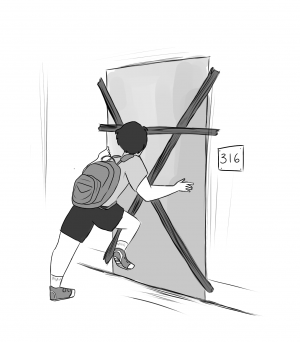No, club exclusivity favors the experienced
October 30, 2019
At the beginning of every year, RM’s Main Street bustles with decorated poster boards and curious students scribbling their email down at table after table. This event, known as the Club Fair, brings countless opportunities for students looking to continue a familiar passion and discover new interests. As one of the most close-knit, stimulating and rewarding experiences a school can offer, clubs prosper by means of welcoming all students, regardless of grade or skill.
From science and math to art and juggling, RM’s clubs encompass a wide range of interests and activities for students to participate in. “The main objective of high [school] clubs is to give everyone, especially freshmen, an opportunity to explore and develop what they are interested in and help tailor their future career pathways,” sophomore Myka Fromm said. With so many students unsure of their future and passions, clubs provide a great way for them to try out a variety of activities that transform into specific interests through the four years of high school.
However, many clubs, such as the debate team and science bowl, hold rigorous try outs that exclude all who do not make it in. Before a student can see for themselves whether they enjoy the club’s activities, they are rejected—punished simply for having not enough experience and ability.
Many students feel that they have the right as active learners and opportunity pursuers to try out clubs freely. “Especially for freshmen, who are trying to try new opportunities, it is important for clubs to allow us to join and broaden our activities,” freshman Phoebe Freeman said. Clubs must understand that a student’s skill level at the very beginning of the year does not indicate their future potential.
A student might not be experienced in an area at first, but can end up being a valuable member of the team in the future. “You shouldn’t exclude people because of their current skill set and knowledge because they have the opportunity to improve later as they participate in club activities,” Fromm said. Ultimately, inclusivity allows clubs to tap into a larger base of talent, as not every talented person is born talented.
Thousands of students roam the halls of RM. Club inclusivity allows students to adjust to the environment and make friends that they would otherwise not know. “Clubs shouldn’t be exclusive because clubs allow students to communicate with each other and socialize. Limiting the students from joining a club will limit their opportunities to do so,” sophomore Monica Escalante said.
Many exclusive team clubs also often demand extensive and rigorous application processes that may unintentionally cause students to misconstrue the level of competition. A student who is interested in the club might have a difficult time finding out if it is a right fit because of the large commitment associated with applying and joining. This discouraging process can turn many potential members away at the door and remove students of many great opportunities.
Most clubs, such as RM’s history club, DECA, and Fine Lines, accept everyone who are interested in participating, but include special positions for those who are particularly skilled and active. “If you accept everyone, you can still limit who is going to have the executive positions if they are not as talented or good at the club activity,” sophomore Riki Doumbia said. Leadership positions allow all students to be included according to skill level, while still promoting the progress of the club itself.
The inclusivity of many RM clubs have proved to be successful among the students. “When I first came to RM, I wasn’t really brilliant at one specific thing because I was keeping my options open. I am so thankful that many of our clubs here are inclusive to everyone because
it has allowed me to see what I like and don’t like and simultaneously improve in many subjects,” sophomore Angelina Guhl said. Inclusivity is a driving force for many students in prospering through their high school careers and future lives, and it can also introduce students to new interests.
For many club rejects, being dismissed from a team is upsetting and comes across as unfair. “It really shouldn’t be their decision. I mean, shouldn’t everybody be able to join every club?” freshman Carson Smith said. To the majority of students who do not make it to a team, exclusivity takes away not only opportunities, but self-confidence, leaving blame upon themselves for falling short and discouraging them from pursuing future endeavors in that area.
Fundamentally, clubs are made for all students. With the wide recognition RM obtains from its diverse clubs, exclusivity is not a virtuous look. As Riki Doumbia said, “Cutting people at the door is simply just not very welcoming and nice of a club to do.”
In a time of growing up, finding friendship, and discovering oneself, high school needs its clubs to open their doors to everyone. Through these inclusive acts, students with no prior talent and experience are able to break out of their shell and flourish with skill. After all, clubs have no way to determine who will become the next Albert Einstein or Ruth Bader Ginsburg.


